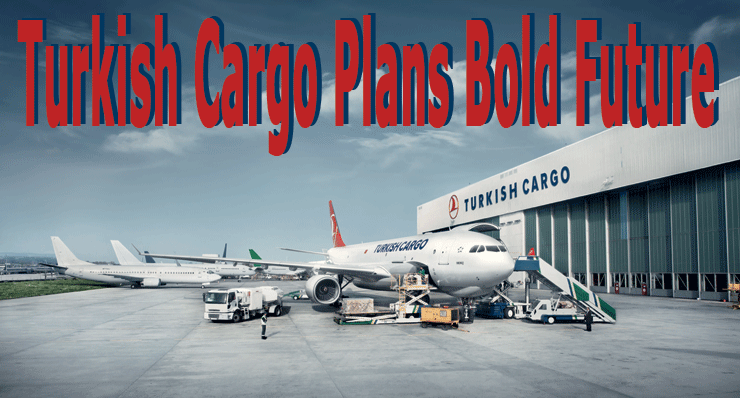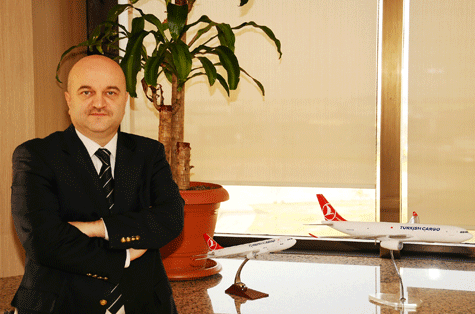
 In
a few short weeks, IATA World Cargo Symposium (WCS) will gather all
the top executives of this industry together in Istanbul, Turkey. In
a few short weeks, IATA World Cargo Symposium (WCS) will gather all
the top executives of this industry together in Istanbul, Turkey.
What these princes of air cargo are likely
to discover or learn at WCS is open to question.
But undoubtedly, one impression that will
be made loud and clear is that Turkish Airlines Cargo in 2011 has emerged
upon the global scene as not only a player, but is also leading the
way with aggressive marketing and spirited service delivery.
There is more spirit to THY Cargo, which
today is a high profile professional organization well worth getting
to know a little better.
Talk about a sure thing: here we speak
exclusively with Senior Vice President Cargo, Abdullah Soner Akkurt
who offers an up close and personal look at Turkish Cargo, which emerges
as an exciting and driving factor to what otherwise should be an interesting
Air Cargo Week at the Hilton Istanbul Hotel from March 8-10, 2011.
FT: Please describe
the current business climate for THY Cargo. What kind of year was 2010
and what lies ahead for 2011?
ASA: Turkish
Airlines was the fastest growing airline in Europe during the financial
crisis. We invested more and tried to take advantage of the crisis.
We have been successful with this strategy. Contrary to other airlines,
we increased our revenues, traffic share and profits. In 2009, Turkish
Airlines carried more than 25 million passengers and 230,000 tons of
cargo. In 2010, we reached 29.4 million passengers and 313,000 tons
of cargo. The natural feature of Istanbul being a bridge between Asia
and Europe plus the proactive foreign policy of the Turkish government
helped us to reach this success.
The main focus for 2011 is to have it
be the year of operational productivity and quality, in addition to
increasing global brand awareness for Turkish Airlines. New aircrafts
are going to join the fleet, new destinations will be opening, and renewing
of facilities and frequency increases are going to happen. Furthermore,
great increases in passenger and cargo traffic are expected parallel
to capacity increases. For 2011, our target is 35 million passengers
and 380,000 tons of cargo.
FT: What air cargo
equipment are you operating and what destinations are new or will be
added?
ASA: Turkish
Airlines has one of the youngest fleets in Europe, with the average
fleet age being 6.5 years. The current
fleet consists of 154 Airbus and Boeing airplanes, including 5 freighters.
Our freighter fleet is comprised of four A310s with 36 tons of capacity
and one A330-200 with 70 tons of capacity; the total number of freighters
will reach six by the first half of this year with the joining of a
second A330F.
Our company aims to expand its services
globally every day. Our policy is to have one of the largest networks
within the airline business sector, thus creating a global footprint.
We currently operate in 26 scheduled cargo destinations with our freighters:
Beirut, Cairo, Dubai, Cologne, Tbilisi, Damascus, Amman, Tel Aviv, Almaty,
New Delhi, Frankfurt, Maastricht, Zurich, Paris, Madrid, Pristina, Milan,
Algeria, Tripoli, Casablanca, Tiran, London, Shanghai, Hong Kong, Tashkent,
and Bishkek.
During 2011, we are planning to operate
with our A310F to Munich, Jeddah, Bucharest and Addis Ababa, and with
our second A330-200F to Dhaka, New York and Singapore.
With Turkish Airlines still planning to
add new routes to its network, we now stand at 172 destinations, such
as, Los Angeles, Shiraz, Manila, Atlanta, Malaga, Valencia, Toulouse,
Kabul, Naples, Turin, Genoa, and Basra.
FT: How has the B777
impacted your cargo business?
ASA: By
2009, Turkish Airlines started to incorporate B777 airplanes into its
fleet. We know that apart from its passenger capacity, the aircraft
offers huge belly capacity for long-haul destinations. With a full passenger
load, it offers approximately 20-30 tons of cargo availability. Thus,
we can openly say it has affected our business positively through the
ability to optimize the offered cargo capacity.
In 2010 with the B777 belly capacity we
served our customers at destinations such as BKK, DXB, HKG, JFK, LHR,
NRT, PEK, and PVG. In 2011, more destinations will be added with the
arrival of two more such aircraft to our fleet. At the end of this year,
we can say that the cargo capacity offered with our B777 will be a total
of 330 tons per day.
FT: Why should shippers
prefer utilizing THY air cargo services?
ASA: In
a competitive and fragile international air cargo market where businesses
compete for customers, customer satisfaction becomes a key element of
our business strategy. In order to achieve maximum customer satisfaction,
the primary focus of Turkish Cargo is to have a 'Customer-oriented approach’
within the framework of our quality policy. To achieve this end, we
tend to use our existing facilities in a suitable manner to meet customer
needs and to renovate our operational procedures in a leaner way in
order to make our shipment process clear and fast. We also aim to simplify
our service for our customers, so we renovated our website www.turkishcargo.com.tr
in order to meet customer demands, and also to offer the easiest way
to monitor their shipment at every step.
Moreover, Turkish Cargo has participated
in the Cargo2000 project to increase its performance operationally and
to meet customer expectations for higher service quality. Thus, we target
sustainable growth with an ever-widening flight network and cargo capacity
by increasing our share in the global air cargo market. We re-engineered
the transportation process from the shipper to the consignee attaining
the applicable standards with the assistance of our IT department.
FT: Describe your
operations in Turkey and connectivity throughout the world, especially
the Middle East.
ASA: According
to a preliminary traffic report of the Airport Council International
(ACI), one of the main contributors to the 2010 growth in air cargo
volume is the Middle East. This growth will also continue in the coming
years and so the region will continue to be one of the most dynamic
aviation markets, with the dedication of regional and global operators
for big infrastructural developments in the main airports such as Istanbul,
Dubai, Abu Dhabi and Doha.
Based on January-May 2010 statistics,
the MENA region is now considered in 3rd place in Turkish Cargo general
volume. In 2010 the cargo carried from the North African region doubled
in volume compared to the previous year, and the cargo carried from
the Middle East rose 13 percent from the same period.
MENA is a very important air cargo market
and at the same time it is an emerging market. Turkish Airlines, paralleling
Turkish Cargo, expanded its network capability in 2009 and currently
operates in 26 cities in the region. As mentioned before, Turkish cargo
also has a good network of scheduled freighter service to Casablanca,
Algiers, Tripoli, Cairo, Tel-Aviv, Dubai, Amman, Damascus and Beirut.
The market affords many opportunities truly making Turkish Cargo a global
business resource.
FT: Next month (March
8-10, 2011) THY is the host airline at IATA World Cargo Symposium. What
are the most important impressions that you would like to make on delegates
attending the event and possibly visiting Istanbul for the first time?
ASA: The
5th IATA World Cargo Symposium, the annual scheduled meeting of IATA,
is going to be held in Istanbul March 8-10, 2011. The 2011 IATA World
Cargo Symposium is an important event for setting the industry’s
global priorities and future of the air cargo supply chain.
TURKISH CARGO is the host sponsor of IATA
World Cargo Symposium. The World Cargo Symposium is going to start with
the inauguration speeches Mr. Temel Kotil, CEO of Turkish Airlines,
and top IATA executives. It comprises a half-day plenary session focused
on the needs of the customer, a Cargo Executive Summit of heads of cargo
from the supply chain, 18 cargo industry meetings and 12 cargo forums,
all of which take place over three days. More than 700 delegates, top
executives and key decision makers from the air cargo supply chain,
airlines, forwarders, GHA, GSA, customs, airports, shippers and vendors
are expected to participate.
FT: Why is Turkey
a preferred country for business and tourism?
ASA: According
to Worldbank’s business rankings, Turkey is amongst the world’s
best economies for business. Its geographical position is more competitive
vis-a-vis the neighboring countries. We can easily say that Turkey has
the most stable political environment in the region, and that also affects
investors’ choices to invest here. Turkey has one of the most
rapidly growing economies in the world, which gives momentum for growth
of companies choosing Turkey for doing their business.
Turkey connects the East and the West
both literally and figuratively. What words can describe Turkey? You
would search in vain for a country where the history and culture is
as impressive as Turkey. The civilizations of the world have left their
own distinct marks on these lands. Turkey is full of intact remains
from the Hittites, Romans, Byzantines and Ottomans. They all had their
capitals on this soil.
Turkey has so much to offer her visitors—breathtaking
natural beauties, unique historical and archaeological sites, steadily
improving hotel and tourist infrastructure, a tradition of hospitality
and competitive prices. It is not surprising therefore that this country
has recently become one of the world's most popular tourism destinations.
Today Turkey is abuzz with life, energy
and enterprise. It is a modern, secular country with a booming economy.
It embraces its future as a bridge between the East and West. Its cities
teem with vibrant cosmopolitan life. Wherever you travel in Turkey,
the country and its people will amaze and inspire, the surge of its
market forces and the modernization of the infrastructure of the whole
country is impressive. Turkish hospitality and genuine warmth is a tradition.
Turkey has become a preferred country for incentive groups and meetings
in recent years. As a result of this, each year the number of tourist
establishments devoted to big groups and incentive services are increasing.
FT: Turkish Cargo
is celebrating 75 Years - why is the company successful and admired?
ASA: TURKISH
CARGO carried its first international cargo in 1936 and is experiencing
the thrill of achieving 75 years of international cargo transportations
in 2011. Today, it is proud to have reached over 300,000 tons of cargo
in a year. With the title of Europe's fastest growing company in 2009,
TURKISH CARGO delivers customer cargo to over 170 destinations all around
the world. It is the strongest candidate for the fastest growing air
cargo brand of Europe. Furthermore, it is preparing to add the 2nd new
generation Airbus 330-200F cargo aircraft in June of 2011 after having
added the first Airbus 330-200F to the fleet in September. With the
addition of this freighter, Turkish Cargo plans to open new routes and
will increase frequencies on existing routes.
FT: What plans are
in place that will help promote success for the next 75 years?
ASA: TURKISH
CARGO is trying to increase its brand awareness by attending air cargo
fairs in Kenya, Hong Kong, Germany, Brazil and the U.S. in 2011 and
also by hosting the IATA World Cargo Symposium, the most important event
of the industry to be held in Istanbul in March 2011. Brand awareness
activities have started with the launch of the newly designed web site
of Turkish Cargo. In its 75th anniversary of international cargo transportation,
Turkish Cargo is moving rapidly to taking its place among the world's
air cargo giants.
FT: What is the greatest
challenge to your business in air cargo moving ahead?
ASA: There
are still challenges to the air cargo industry, such as low yields,
volatile fuel prices and matching capacity to demand. Being aware that
our industry is fragile, more fragile than every other service industry,
we must take intelligent steps for the future. Air cargo companies must
be leaner, more cost-efficient and wiser after having experienced the
economic downturn. The industry must exploit its advantages, such as
security, speed and reliability. Air cargo must be seen as a total supply
chain, together with the shipper, consignee, custom, freight forwarder
and carrier. The comprehensive cargo screening programs must be used
industry wide, and in a cost-efficient way, supported by new technologies
and causing little disruption to customers and operators. In terms of
customs, there is still need for drastic changes—to reduce origin-destinations
timing and to pair more commonly applied customs requirements with widely
used electronic data transfers. All this must be done in order to make
air cargo more secure, simple and reliable in the future.
Security is the main issue for coming
years, especially for air carriers after the incidents that occurred
in Yemen. It’s obvious that the air cargo industry is more vulnerable
to such kinds of terrorist attacks, so there must be a common vision
in the industry in order to have reliable security standards.
FT: How did you get
into the air cargo business?
ASA: I
entered Turkish Airlines at 2004 and started in the Marketing Department
of the passenger side. After being promoted to Senior Vice President
of Marketing and Sales for passenger side, I was appointed as Cargo
Senior Vice President and continue my work here.
Geoffrey Arend/Flossie
|




